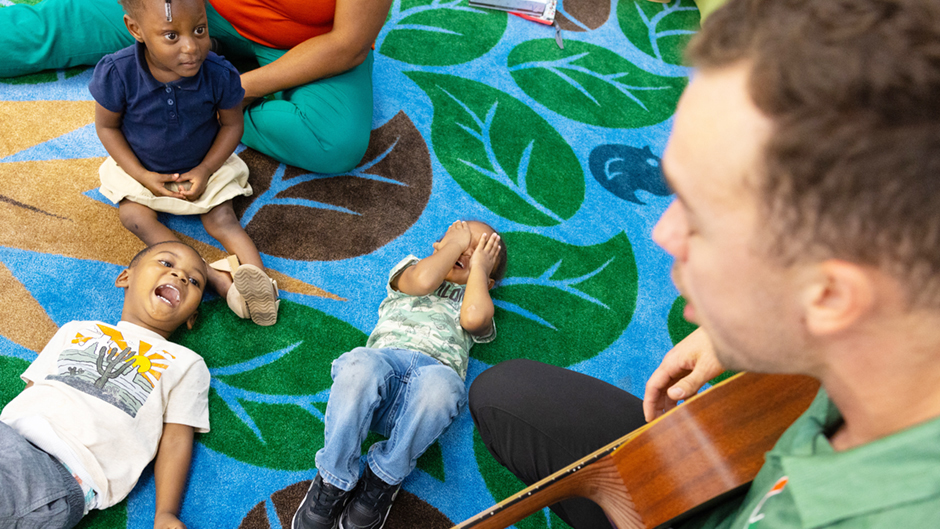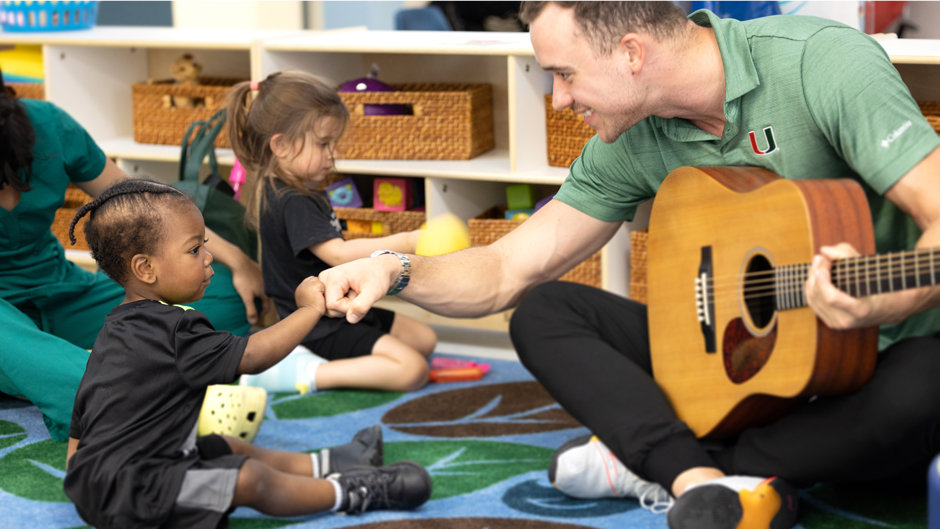Alexandria Brown is finally starting to feel like she can offer a better life for her children.
For the past few years, Brown had to pick up her children from the University of Miami’s Linda Ray Intervention Center(LRIC) by 2 p.m., so the single mother struggled to find a solid full-time job. Still, she knew both of her children needed the early intervention support the center provides, and she often took part-time work.
But this school year, things turned around. As a result of grants from The Miami Foundation and the Batchelor Foundation, the center can now stay open until 5 p.m. It is also offering enrichment activities to its students, who range from newborn to age 3 and often face developmental delays. Now, Brown can work security and pick up her 2-year-old daughter, Harmoni, from the LRIC and her son, Jeremiah, 5, from his school without having to worry about choosing between a job and her kids.
“I’m just happy I can work and provide for my kids again,” Brown said, adding that she also found a better apartment for them. “It’s a big improvement.”
Before the change, she considered moving Harmoni to a different school, but Brown is relieved she did not have to do that. Born at 25 weeks of gestation, Harmoni spent several months in the hospital before she could go home with oxygen. However, the toddler is thriving at the center, which she started attending at around 9 months old. Last week, the toddler giggled and followed some of the hand motions during a class led by Taylor Wright, a music therapy graduate student from the Frost School of Music. Her brother also attended the LRIC.
“She learns a lot here, and every day I am surprised by the different things she is telling me about. For example, she started walking at school before she was walking at home, and her speech has improved quite a bit,” Brown added. “Every time she comes home, Harmoni uses new words to name things she sees.”
For 30 years, the Linda Ray Intervention Center—part of the College of Arts and Sciences Department of Psychology—has been offering care for at-risk infants and young toddlers who face developmental delays. It is also a research facility for the University and is often the site of cutting-edge work on early development in areas such as language and ways to foster supportive family interactions. It receives support from the University; Infants in Need, Inc.; The Children’s Trust; Miami-Dade County Public Schools; and the Florida Department of Education’s Bureau of Exceptional Education and Student Services.

Since the LRIC extended its hours, director Isabel Chica said enrollment has grown dramatically. While two years ago there were just 18 students at the center, today there are 43, with a maximum capacity of 45. The grants also have allowed development of an enrichment program with extracurricular activities that include sensory exploration, art, creative movement, dance, and music.
“In this first year, we’ve had an overwhelming response—we saw a huge increase in enrollment because of our ability to provide full-day care and include enrichment activities,” Chica said. “And we are so thankful to the Miami Foundation and the Batchelor Foundation for allowing us to extend our program and provide that enrichment to help kids stay here while their families can work.”
As part of the Donna E. Shalala MusicReach program, Wright enjoys spending each Friday visiting the LRIC to provide music enrichment classes to the students. It is his first field experience since starting the master’s-degree program in music therapy this fall, and he loves forming bonds with the kids, as well as using strategies he is learning to teach class.
“This is a critical period of development for the brain and the more we can expose kids to music interventions, the better,” said Wright. “Through music class, I am able to directly affect their ability to do other things. For example, research shows that following a rhythm can have crossover for a child’s ability to acquire language or think critically. And it all started with exposure to live music.”

